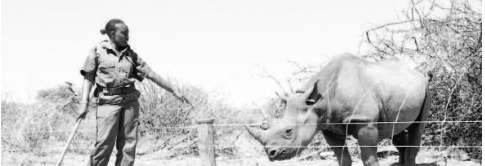Samburu ranger adopts abandoned newborn rhino, raises it as own

It was love at first sight for Salome Lemalasia, a trained ranger and Loijipu, a baby rhino, barely two days old, who had been left behind by its mother on the day they met in 2017.
Noticing the instant connection between the two, her bosses gave her the responsibility of nurturing it to health, and their bond has since grown stronger he bond between a mother and her child is arguably unbreakable.
In its purest form, it is said to be the only true love that is unfettered and of endless potential. The ability to nurture is often said to be transcendent and can also take care of animals, either as pets at home, in the wild or even in a confined space, such as a zoo or an orphanage.
Deep in the Samburu County Rangelands, 28-year-old Salome Conservancy answered what seemed to be an unusual call, but not unheard of within the conservation circles.
Having taken care of wild animals within enclosures and in the wild across the conservancy, she was tasked with nurturing and catering to the needs of an abandoned male black rhino christened, Loijipu at just the tender age of nine months.
As the story goes, Little Loijipu, the second born within his family was deserted 48 hours after being born back in 2017 when researchers conducting studies in the Sera Conservancy are said to have scared off his mother never to return.
As an abandoned rhino calf, he was shortly after put in the care of Reteti Elephant Sanctuary in Namunyak CommunityConservancy until 2018, when he was translocated back to Sera in attempt to reconnect him with his original habitat.
Uncontested connection
On his first day back, Loijipu is said to have developed a strong bond with Lemalasia, almost always never leaving her sight.
On the occasion she was entrusted to other caregivers, she became reclusive and shy only becoming active around her.
“Initially I was very scared of him, touching him was also a problem, but with time he actually became fond of me. He started eating when I fed him, even when he rested I was the one taking care of him since I sleptclose to him for years,” said Lemalasia.
Her voice has become a special tether linking him to a calm environment, which has enabled him to slowly, but surely adapt to the conservancy and more so the wild across the years.
With a heightened sense of hearing and smell, the bond between the two has only become stronger. On occasions, Loijipu is said to even protect Lemalasia from impending danger while in the wild,warning her by grunting and stamping his feet on the scorched earth.
Forming the bond with the rhino was, however, not an easy task, as a fear of abandonment, no doubt distressed the animal.
Also, being a creature of the wild, it was wise to always be cautious while around it.
Like her own child
Sometimes being on the crossroads of other wild animals including full-grown rhinos within the conservancy, he is put in an enclosure during the night and returned to the wild during day time usually alongside Lemalasia.
Christened ‘mama rhino’, Lemalasia just like a mother knows when the rhino is sick and even assists veterinary doctors to administer medicine to him.
“My children used to ask whether I was scared whenever I was around the rhino, but I told them that a mother is never scared of her children. Though at times explaining the bond between me and a wild animal is not so easy,” she said.
Loijipu, whose name means ‘the one who follows’ in Samburu has become a star attraction for scores of tourists who visit the conservancy on a regular basis and as such, the management has prioritised his security.
Conservation has now become a huge part of Lemalasia’s life who even in her spare time encourages members of the community to protect the wildlife within their communities at all costs.
“As a mother, I know one day he will have to leave the sanctuary. I feel I amnot ready, but I will have to let him go one day,” said a teary Lemalasia.
Sera conservancy is home to 19 black rhinos and with black rhinos remaining amongst the world’s most endangered animals, the Northern Rangelands Trust (NRT), a grassroots conservation has helped the conservancy in which Loijipu is housed to protect the rhinos.
It has partnered with the establishment and set up sophisticated anti-poaching mechanisms such as 24- hour ClosedCircuit Television (CCTV) cameras, which monitor the animals’ movements while combating threats against them.
Working with the community
No cases of poaching have been reported at the conservancy in recent years.
“The conservancy and its environs arevery key areas, so if anyone attempts to interfere with the animals we can see them. Also when we are tracking down a rhino, it is easy to know where it went, especially when we saw it drinking water,” said Jalisa Lengpe, surveillance officer.
“NRT helped us form organised systems and sensitise communities on the importance of protecting wildlife and its importance to the community. As a result, in our team we have managed to incorporate officers from various communities, which has really helped us maintain peace and change our economic fortunes,” said William Lekilwa, Commander 9-1 Anti-Poaching Unit, Sera Conservancy.












